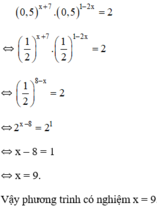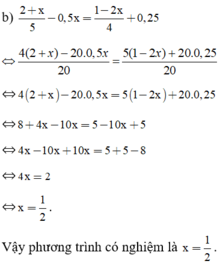Giải các phương trình: |2 – x| = 0,5x – 4

Những câu hỏi liên quan
Giải các phương trình sau:
\(\dfrac{2+x}{5}-0,5x=\dfrac{1-2x}{4}+0,25\)
Giúp mình với ạ :333
Mãi iu mọi người ><
=>0,2x+0,4-0,5x=0,25-0,5x+0,25
=>0,2x+0,4=0,5
=>0,2x=0,1
=>x=1/2
Đúng 0
Bình luận (0)
Giải phương trình:0,5x(x-3)=(x-3)(2,5x-4)
<=>0,5x(x-3)-(x-3)(2,5x-4)=0
<=>(x-3)(0,5x-2,5x+4)=0
<=>(x-3)(-2x+4)=0
<=>(x-3)*2(4-x)=0
<=>x-3=0 hoặc 4-x=0
<=>x=3 hoặc x=4
Đúng 0
Bình luận (0)
Giải các phương trình mũ: 0 , 5 x + 7 . 0 , 5 1 - 2 x = 2
Giải các phương trình sau:
a) 7-(2x+4)= -(x+4)
b) 2+x/5 - 0,5x= 1-2x/4+0,25
c) x/3- 2x+1/2= x/6-x
d) x-1/59+x-2/58+x-3/57= x-59/1+x-58/2+x-57/3
Xem chi tiết
a) Ta có: \(7-\left(2x+4\right)=-\left(x+4\right)\)
\(\Leftrightarrow7-2x-4=-x-4\)
\(\Leftrightarrow-2x+3+x+4=0\)
\(\Leftrightarrow-x+7=0\)
\(\Leftrightarrow-x=-7\)
hay x=7
Vậy: S={7}
b) Ta có: \(\dfrac{2+x}{5}-0.5x=\dfrac{1-2x}{4}+0.25\)
\(\Leftrightarrow\dfrac{4\left(2+x\right)}{20}-\dfrac{0.5x\cdot20}{20}=\dfrac{5\left(1-2x\right)}{20}+\dfrac{20\cdot0.25}{20}\)
\(\Leftrightarrow4\left(2+x\right)-10x=5\left(1-2x\right)+5\)
\(\Leftrightarrow8+4x-10x=5-10x+5\)
\(\Leftrightarrow-6x+8=-10x+10\)
\(\Leftrightarrow-6x+8+10x-10=0\)
\(\Leftrightarrow4x-2=0\)
\(\Leftrightarrow4x=2\)
hay \(x=\dfrac{1}{2}\)
Vậy: \(S=\left\{\dfrac{1}{2}\right\}\)
d) Ta có: \(\dfrac{x-1}{59}+\dfrac{x-2}{58}+\dfrac{x-3}{57}=\dfrac{x-59}{1}+\dfrac{x-58}{2}+\dfrac{x-57}{3}\)
\(\Leftrightarrow\dfrac{x-1}{59}-1+\dfrac{x-2}{58}-1+\dfrac{x-3}{57}-1=\dfrac{x-59}{1}-1+\dfrac{x-58}{2}-1+\dfrac{x-57}{3}-1\)
\(\Leftrightarrow\dfrac{x-60}{59}+\dfrac{x-60}{58}+\dfrac{x-60}{57}=\dfrac{x-60}{1}+\dfrac{x-60}{2}+\dfrac{x-60}{3}\)
\(\Leftrightarrow\left(x-60\right)\left(\dfrac{1}{59}+\dfrac{1}{58}+\dfrac{1}{57}\right)-\left(x-60\right)\left(1+\dfrac{1}{2}+\dfrac{1}{3}\right)=0\)
\(\Leftrightarrow\left(x-60\right)\left(\dfrac{1}{59}+\dfrac{1}{58}+\dfrac{1}{57}-1-\dfrac{1}{2}-\dfrac{1}{3}\right)=0\)
mà \(\dfrac{1}{59}+\dfrac{1}{58}+\dfrac{1}{57}-1-\dfrac{1}{2}-\dfrac{1}{3}\ne0\)
nên x-60=0
hay x=60
Vậy: S={60}
Đúng 1
Bình luận (0)
Giải các phương trình :
a) \(\dfrac{x}{3}-\dfrac{2x+1}{2}=\dfrac{x}{6}-x\)
b) \(\dfrac{2+x}{5}-0,5x=\dfrac{1-2x}{4}+0,25\)
a) \(\dfrac{x}{3}-\dfrac{2x+1}{2}=\dfrac{x}{6}-x\)
\(\Leftrightarrow\dfrac{2x}{6}-\dfrac{3\left(2x+1\right)}{6}=\dfrac{x}{6}=\dfrac{6x}{6}\)
\(\Leftrightarrow2x-3\left(2x+1\right)=x-6x\)
\(\Leftrightarrow2x-6x-3=x-6x\)
\(\Leftrightarrow2x-6x-x+6x=3\)
\(\Leftrightarrow x=3\)
\(S=\left\{3\right\}\)
b) \(\dfrac{2+x}{5}-0,5x=\dfrac{1-2x}{4}+0,25\)
\(\Leftrightarrow\dfrac{4\left(2+x\right)}{20}-\dfrac{10x}{20}=\dfrac{5\left(1-2x\right)}{20}+\dfrac{5}{20}\)
\(\Leftrightarrow4\left(2+x\right)-10x=5\left(1-2x\right)+5\)
\(\Leftrightarrow8+4x-10x=5-10x+5\)
\(\Leftrightarrow4x-10x+10x=5+5-8\)
\(\Leftrightarrow4x=2\)
\(\Leftrightarrow x=\dfrac{1}{2}\)
\(S=\left\{\dfrac{1}{2}\right\}\)
Đúng 0
Bình luận (0)
Giải các phương trình: |0,5x| = 3 – 2x
Ta có: |0,5x| = 0,5x khi 0,5x ≥ 0 ⇔ x ≥ 0
|0,5x| = -0,5x khi 0,5x < 0 ⇔ x < 0
Ta có: 0,5x = 3 – 2x ⇔ 0,5x + 2x = 3 ⇔ 2,5x = 3 ⇔ x = 1,2
Giá trị x = 1,2 thỏa mãn điều kiện x ≥ 0 nên 1,2 là nghiệm của phương trình.
-0,5x = 3 – 2x ⇔ -0,5x + 2x = 3 ⇔ 1,5x = 3 ⇔ x = 2
Giá trị x = 2 không thỏa mãn điều kiện x < 0 nên loại.
Vậy tập nghiệm của phương trình là S = {1,2}
Đúng 0
Bình luận (0)
Giải phương trình: 0,5x(x – 3) = (x – 3)(1,5x – 1)
0,5x(x – 3) = (x – 3)(1,5x – 1)
⇔ 0,5x(x – 3) – (x – 3)(1,5x – 1) = 0
⇔ (x – 3).[0,5x – (1,5x – 1)] = 0
⇔ (x – 3)(0,5x – 1,5x + 1) = 0
⇔ (x – 3)(1 – x) = 0
⇔ x – 3 = 0 hoặc 1 – x = 0
+ x – 3 = 0 ⇔ x = 3.
+ 1 – x = 0 ⇔ x = 1.
Vậy phương trình có tập nghiệm S = {1; 3}.
Đúng 0
Bình luận (0)
Giải phương trình:
2
+
x
5
-
0
,
5
x
1
-
2
x
4
+
0
,
25
Đọc tiếp
Giải phương trình: 2 + x 5 - 0 , 5 x = 1 - 2 x 4 + 0 , 25
1.giải các phương trình sau:
A.3x+9=0
B.3x-2=0
C.4-2x=0
D.-2x+6=0
E.0,5x-1=0
F.3,6-0,6x=0
G.2/3x-1=1/3
H.-1/3x+1=2/3x-3
i.4x-3=2x+1
a: =>3x=-9
hay x=-3
b: =>3x=2
hay x=2/3
c: =>2x=4
hay x=2
d: =>-2x=-6
hay x=3
e: =>0,5x=1
hay x=2
f: =>0,6x=3,6
hay x=6
g: =>2/3x=4/3
hay x=2
h: =>-3x+3=6x+2
=>-9x=-1
hay x=1/9
i: =>4x-2x=1+3
=>2x=4
hay x=2
Đúng 1
Bình luận (0)
\(A.3x+9=0\)
\(\Leftrightarrow3x=-9\)
\(\Leftrightarrow x=-2\)
\(B.3x-2=0\)
\(\Leftrightarrow3x=2\)
\(\Leftrightarrow x=\dfrac{2}{3}\)
\(C.4-2x=0\)
\(\Leftrightarrow4=2x\)
\(\Leftrightarrow x=2\)
\(D.-2x+6=0\)
\(\Leftrightarrow6=2x\)
\(\Leftrightarrow x=3\)
\(E.0,5x-1=0\)
\(\Leftrightarrow0,5x=1\)
\(\Leftrightarrow x=2\)
\(F.3,6-0,6x=0\)
\(\Leftrightarrow3,6=0,6x\)
\(\Leftrightarrow x=6\)
\(G.\dfrac{2}{3}x-1=\dfrac{1}{3}\)
\(\Leftrightarrow\dfrac{2}{3}x=\dfrac{4}{3}\)
\(\Leftrightarrow x=2\)
\(H.-\dfrac{1}{3}x+1=\dfrac{2}{3}x-3\)
\(\Leftrightarrow4=x\)
\(\Leftrightarrow x=4\)
\(I.4x-3=2x+1\)
\(\Leftrightarrow2x=4\)
\(\Leftrightarrow x=2\)
Đúng 1
Bình luận (0)





















